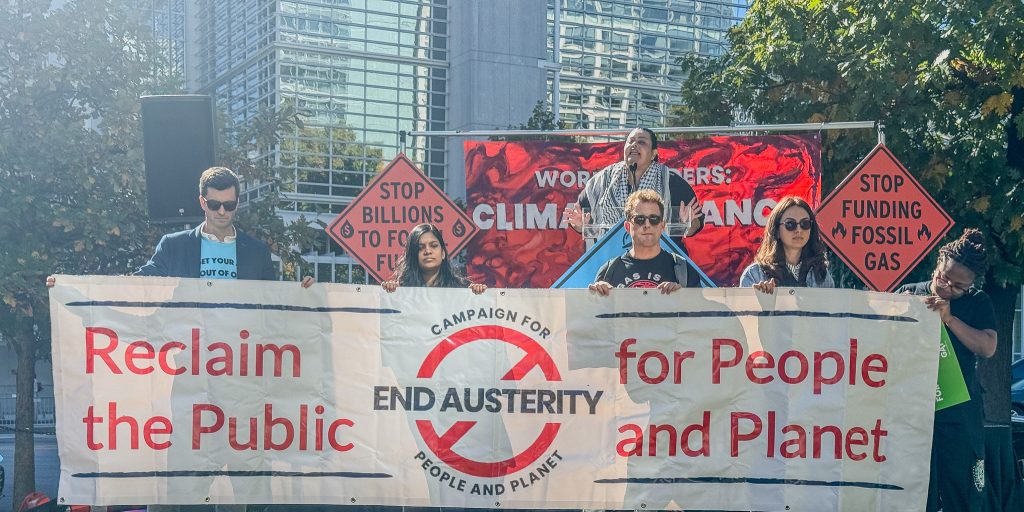At this year’s IMF and World Bank annual meetings in Washington DC, ActionAid joined a global coalition of civil society voices demanding an end to debt-driven austerity and championing a vision for a fairer, more resilient world economy. ActionAid and allies stood shoulder-to-shoulder with communities, activists, and youth leaders to bring urgent calls for economic justice right to the steps of global financial powerhouses.
Shaping the conversation on austerity, climate, and gender equality
ActionAid has long called attention to the dire impacts of austerity on communities around the globe. Our report, Fifty Years of Failure: The IMF, Debt, and Austerity in Africa, lays bare how IMF-mandated austerity cuts devastate essential public services and push communities further into poverty — a message that our team shared both inside and outside the official meetings.
Joining our global allies, we echoed the urgent need to end public sector wage bill cuts, a recommendation underscored in The Public Versus Austerity: Why public sector wage bill constraints must end report. Together, we called on IMF and World Bank leaders to replace austerity measures with funding for public services that foster resilience and opportunity.
Centering climate justice in financial reform
Another major theme was the intersection of the climate crisis and the debt crisis. In our report,, The Vicious Cycle: Connections Between the Debt Crisis and Climate Crisis, we highlighted how climate-vulnerable countries face crushing debt burdens that prevent them from investing in climate resilience and adaptation. Through workshops, panels, and our advocacy work, we made the case for solutions that don’t leave countries facing impossible trade-offs between servicing debt and protecting their communities.
Our team also amplified findings from the Finding Finance: Tax Justice And The Climate Crisis, which explores the intersection of tax justice and climate finance. We highlighted how progressive tax systems can generate the resources needed to address the climate crisis. emphasized the responsibility of wealthier nations and corporations – who have benefited from climate-destructive activities – to contribute to climate reparations. while advocating for equitable, sustainable solutions that prioritize countries in the Global South. We urged policymakers to rethink how climate finance is distributed and called for financial support to be equitable, sustainable, and accessible, especially for countries in the Global South, which bear the brunt of the climate crisis despite contributing the least to its causes.
Feminist economic justice on the global stage
From gender-responsive policies to reforming harmful economic mandates, bringing a feminist perspective is critical. The Care Contradiction: The IMF, Gender, and Austerity, underscored how austerity policies harm women, particularly those in low-income countries who are often employed within or rely on public services. Alongside allies, we called on the IMF to publish and implement its gender toolkits to ensure that economic policies do not exacerbate gender inequality.
Our advocacy didn’t end with formal meetings — we were in the streets and at community events too. On the International Day for the Eradication of Poverty, we joined a feminist solidarity event, uniting diverse voices to rally against economic systems that perpetuate injustice.
The message we shared in Washington was clear: we need economic models that prioritize well-being, equity, and sustainability. Read more in our report, Imagining Feminist Wellbeing Economies, which illustrates an economy that works for all, challenging the traditional, profit-driven models that undermine human and environmental health.
Demanding a global financial system that serves people and the planet
While we do focus on specific IMF policies at these meetings, we also have the bigger picture in mind. It is clear that the global financial system is hurting vulnerable countries and communities, and we continue to demand accountability and a new direction for global finance.
ActionAid USA’s Executive Director, Niranjali Amerasinghe, moderated a panel discussion and advocated for reforming Special Drawing Rights (SDRs) to support crisis-affected nations in the Global South. Our proposal, Adapting Our Financial Architecture in a Crisis-Prone World, outlines how SDRs can be a powerful tool for climate resilience and recovery from economic shocks if allocated more equitably.
Collective action
As a part of the Global Days of Action, we joined forces with partners across continents, in powerful Twitter storms, workshops and an in-person action organized by Big Shift Global.
Through bold action, in-depth research, and tireless advocacy, ActionAid stood with communities, civil society allies, and advocates from the Global South to demand transformative change. At the IMF and World Bank annual meetings, we made sure that people — not profits — were the focus of every conversation.

